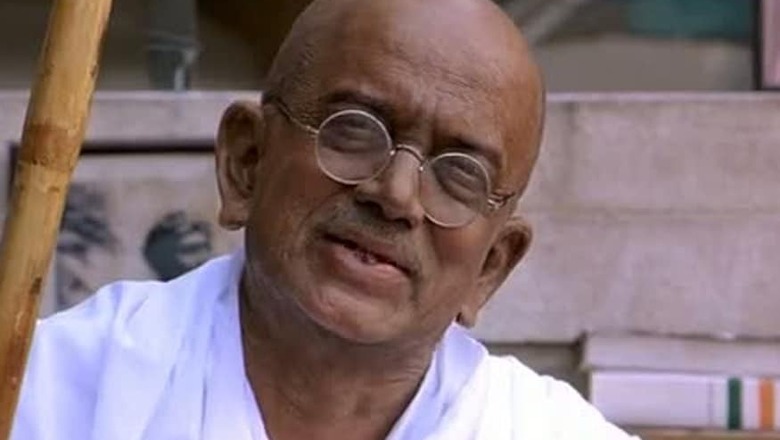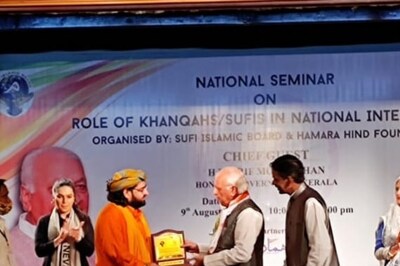
views
The impressive figure that Mohandas Karamchand Gandhi was, he has been a part of several films. Every film has something new to depict - shades of him as a father, a leader, a discriminated-against barrister.
On this Gandhi Jayanti, we bring you a list of films, inspired from the life of Mahatma Gandhi, that you can watch today.
Gandhi: This 1982 film depicts Ben Kingsley as Gandhi. The film describes the life and times of Mahatma Gandhi who freed India from the British rule using peaceful means and thus giving hope and inspiration for generations to come. Gandhi took on an Empire with nothing but truth, non-violence and indomitable will as weapons and won. The film won eight Oscars and 26 other film awards, including BAFTA, Grammy, Golden Globe and Golden Guild awards.
The Making of Mahatma: The story is a journey of the life of Mahatma Gandhi - his first run in with the British and racial discrimination in Britain, his journey to South Africa and his struggle against Apartheid and his return to India. Rajat Kapoor, who played the title role, won the Silver Lotus Award for Best Actor for the film.
Hey Ram: When Saketh Ram's (Kamal Hassan's) wife is raped and killed by rioters, his life changes dramatically and he vows to personally to kill as many Muslims as he can find. He joins a group of Hindu extremists and becomes temporarily taken with the cause himself. When he is persuaded to marry a second time, Saketh Ram begins to settle down but meets a Maharajah (Vikram Gokhale) who manipulates him into committing himself to renouncing his family in the interests of the cause - the assassination of Mahatama Gandhi(played by Naseeruddin Shah).
Lage Raho Munnabhai: It is the second film in the popular Munnabhai series. Sanjay Dutt stars as an underworld don, who begins to see the spirit of Mahatma Gandhi(Dilip Prabhavalkar). Through his interactions with the image of Gandhi, Munnabhai begins to practice what he calls Gandhigiri (Satyagraha, non-violence, and truth) to help ordinary people solve their problems. The film had a strong cultural impact in India, popularising Gandhigiri and stirring popular imagination leading to a number of Gandhigiri style protests in India and the US. It was the first Hindi film to be shown in the United Nations. The film won seven awards including Filmfare, Screen and Zee Cine awards and was nominated for many more.
Maine Gandhi Ko Nahin Mara: Urmila Matondkar plays Trisha Chaudhury, whose Alzheimers-stricken father (Anupam Kher) starts getting hallucinations that he is the assassin of Mahatma Gandhi.
Gandhi My Father: The film is a depiction of a strained relationship between Gandhi and his son. It portrays how Gandhi's first-born, Harilal (played by Akshaye Khanna), didn't inherit his father's brilliance and strayed towards cheating and embezzlement. The story is about the failure of Gandhi as a father to his own son. Shefali Shetty won Best Actress Award at the Tokyo International Film Festival for the film.
Sardar: The Iron Man of India: Vallabhai Patel was born in a wealthy Gujarat-based family and initially did not take part in the freedom struggle, scoffed at Mohandas Gandhi(Annu Kapoor) and referred to him as a Social Worker. But when Mohandas gave a speech in Ahmedabad during 1915, Vallabhai changed his mind, decided to immerse himself in the independence struggle. The film is a biographical epic on Sardar Vallabhai Patel concentrates on the last five years of Sardar's life, from 1945 to 1950 when he emerged on the national scene - a key figure in the freedom struggle and in integrating the nation.
Nine hours to Rama: The film depicts the life of Nathuram Godse, Mahatma Gandhi's assassin. How Godse planned the assassination is shown in the film. The film reveals in a series of flashbacks how Godse became a Hindu activist who, in his mind, blamed the Mahatma for the killings of thousands of Hindus by Muslims. It is based on a book of the same name by author Stanley Wolpert.




















Comments
0 comment